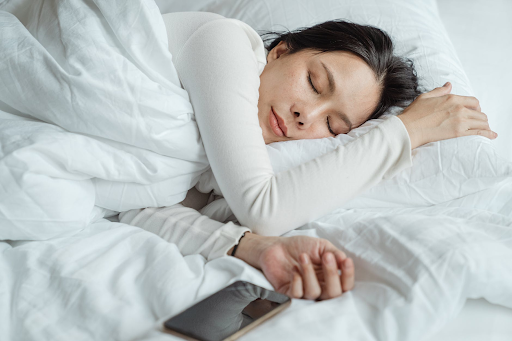
One startling discovery made so far is that night-time phone use is detrimental to sleep. Here are some of the ways using your phone at night will destroy your sleep.
One of the key discoveries in how night-time phone use impacts sleep is the impact on one’s circadian rhythm. Computer and smartphone screens emit blue light wavelengths. During the daylight hours, blue wavelengths can be beneficial, as they keep you attentive and awake while working on your device. However, it’s a different story at night.
Blue lights disrupt your circadian rhythm, signaling wakefulness to your body. This issue is caused by the suppression of melatonin, a naturally occurring hormone that regulates sleep patterns. Before you head to the pharmacy to pick up melatonin tablets, consider putting the phone away before bedtime.
Many newer smartphones have a night setting that shifts the lighting to red wavelengths. This simple shift can help reset your circadian rhythm and promote healthy sleep.
By not unplugging from your phone, you’re not allowing your mind to unplug from the world around you. The next thing you know, it’s after midnight, and you’re feeling more awake than ever. If you’re the type of person who falls asleep watching TV but can stay awake all night scrolling on your phone, this is the likely cause.
If willpower is a challenge for you, consider adding time blocker limitations on specific apps to prevent night-time scrolling. Using time-triggered app blockers can help you build the habit of unplugging and winding down before bedtime.
As mentioned previously, the blue light wavelengths are known to disrupt the body’s natural rhythms. Another factor is the presence of electromagnetic fields. The signals sent and received using electromagnetic fields are thought to cause a decrease in REM (rapid eye movement) during sleep.
The REM phase of your sleep cycle is when most dreams occur. Scientists believe that this sleep cycle phase plays a pivotal role in cognition and memory. Initial studies show a possible correlation between decreased REM and the development of dementia.
Disrupting your body’s rhythms by using your phone at night can lead to tougher mornings and brain fog. Put the phone away for better sleep quality that leads to better focus, cognition, and accomplishment. While it might be your goal to master the art of taking a sleep selfie, you’ll get more favorable results by appearing well-rested, so you can practice during the day.
Unfortunately, using your phone at night-time isn’t always conducive to setting healthy boundaries. There’s no reason to check your work email at 11 pm. However, if your phone is already in hand, you might do so automatically. This could lead to stress and frustration about an issue at work when you should be unplugged and falling asleep. Responding to inquiries at this time could set a precedent that you’re available 24/7, even when you shouldn’t be.
The same logic applies to personal relationships. In the rare occurrences when your friends or family members might have an emergency, it’s ok to be available. However, if you’re just talking about the day or getting pulled into another round of Aunt Suzanne’s family drama, there’s no reason that it can’t wait until tomorrow.
Consider setting your phone on silent and leaving it out of sight and out of mind. Many phones have contact settings that keep texts on silent but override the “do not disturb” setting for phone calls. If you’re worried about missing a real emergency, use this setting.
The simple act of placing your phone out of reach, on silent, across the room can significantly impact your life. You’ll have to get out of bed to hit snooze, which will help you wake up more before you can think about getting five more minutes of fractured rest. While the first few days might be rough, you’ll fall into a new habit that starts to repair your broken sleep cycle.
Furthermore, scrolling through the internet at night makes you more likely to come in contact with negativity and stressful narratives. You aren’t going to get the sleep you need if you’re fighting with people in the comments section on Facebook.
Giving up the phone for an hour before bedtime will help distract your brain from the light. I am not suggesting you keep your phone at 5 percent life but don’t charge your phone next to your bed; otherwise you will be tempted to get on your phone in bed. In fact, “71 percent of people sleep either holding their smartphone, having it in bed with them, or having it on their nightstand.”
Starting with these 7 tips can lead you to healthier sleep patterns and a sleep diary or journal can keep track of changed habits. Quite often patients have a sleep study without adequate information into their nightly habits and get diagnosed with Insufficient Sleep Syndrome, which is basically having terrible sleep as a result of voluntary (albeit unintentional) behaviors that impact their sleep negatively.
If you start to notice a negative pattern that could be corrected by your own choices, make changes after a week and see how your next week goes. If there is a vast improvement to your sleep, you may be able to correct the behavior yourself and avoid having an unnecessary sleep study.
A sleep study may still be the best choice though the type of sleep study varies by a patient’s symptoms. Healthcare providers will monitor your sleep either in a lab or at your home using portable home sleep apnea testing equipment.
If you live in Alaska and are ready to take back your sleep, contact The Alaska Sleep Clinic
@ 907-770-9104
and receive a free 10-minute phone consultation with a sleep educator who can help you determine if a sleep study is right for you.









